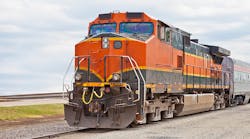Analysis & Commentary
If a handful of prominent members of the House of Representatives get their way, shippers may finally find relief from the freight railroad service crisis and abusive fee practices. But for several reasons, don’t expect the proposed legislation to advance much beyond the proposal stage.
The bill, optimistically titled the Freight Rail Shipping Fair Market Act., would prohibit a railroad from raising rates during a service emergency. It also would allow shippers who own their own railcars to assess demurrage charges against railroads, which shippers have accused of unfairly charging excessive fees for being unable to return railroad equipment, something that too often occurs because railroads deliberately make it operationally impossible to meet the deadlines they set.
“This bill will level the playing field and provide railroad customers—many of which are transporting key food and energy products—the service they deserve,” said Rep. Peter DeFazio (D-OR), a co-sponsor of the legislation and chairman of the House Committee on Transportation and Infrastructure. “It is imperative that our rail network is reliable, and yet consolidation and Wall Street pressures on railroads to cut costs and increase profits have made that near impossible.”
According to DeFazio, the bill also will provide the Surface Transportation Board (STB) with the tools and guidance it needs to fulfill its mandate and better regulate disputes among Class I railroads and their customers, weed out rampant unfair practices, and to incentivize more efficient rail operations.
The bill’s provisions would:
• Strengthen the STB’s authority to address rail service emergencies.
• Require rail contracts to include service delivery standards and remedies, while leaving details to be privately negotiated between the railroads and their customers.
• Provide STB with clear direction to resolve common carrier obligation complaints.
• Create financial incentives for both railroads and their customers to efficiently return and move railcars.
• Support freight railroad efforts to identify where freight is located on their systems while in transit.
• Adequately fund the STB to allow for quicker dispute resolution when petitioned.
It all sounds good and who knows, these changes might actually have a beneficial impact if the measure eventually is enacted. But at present the odds of it getting any further in Congress than the endorsements of a handful of House committee chairmen are precisely zero.
Why Prospects Are Dim
Since it was introduced, the only co-sponsors to step up consist of the chairmen of the various subcommittees of the House Transportation Committee. All of them are Democrats and not a single Republican has signed on (although it is not known whether any were even asked in today’s highly partisan political milieu). Also, no similar bill has been introduced in the Senate.
Even if the Democrats somehow manage to retain control of the House in the upcoming elections, this combination of factors would spell doom for any bill. In addition, the once-powerful DeFazio is not running for re-election and he could very well be fly fishing in Oregon next year when strong leadership will be needed to move the bill forward.
Shippers, however, are ready for the prospect of any kind of relief. American Chemical Council president Chris Jahn hailed the new bill. “This important legislation contains many thoughtful solutions that complement and line up well with the much-needed reforms being considered by the STB,” Jahn said.
On Aug. 5, Jeffrey Sloan, senior director-regulatory affairs for the ACC, told the STB in an e-mail that in a July survey of his members, 46% reported that rail delays and service challenges had gotten worse since the fourth quarter of 2021.
Sloan also informed the board that “only 7% reported that service improved. For comparison, when asked the same question in March [2022], 39% of the ACC members reported that service had gotten worse.” This July, 90% also reported experiencing longer transit times.
High numbers of companies continued to report missed switches (66%), reduced service days (64%), increased demurrage charges (59%), and increased rates (59%), Sloan said. In addition, 43% said they were forced to increase the size of their tank car fleet because of rail service issues—adding railcars to handle the same volume of shipments adds substantial costs for shippers and contributes further congestion to the rail network, he stressed.
Joining ACC in hailing the new bill is a wide range of industry associations that have lined up in support of the bill, many of them members of the Rail Customer Alliance, representing companies large and small damaged by the unending rail service failures. Recent reports range from the Port of Los Angeles being jammed with containers and goods that can’t be moved from dockside to continuing failed deliveries of fertilizer, fuel, grain and even paper ballots needed for elections.
Railroad executives asserted at hearings held earlier this year that things would get better once they were able to train enough new skilled employees to replace the 70,000 they had unwisely fired because of their drastic cost-cutting measures and later because of overreaction to COVID-19. However, since the new recruitment drive began, rail unions have reported that the many of the trainees are walking away when they learn about the burnout suffered by those already on the job.
It should come as no surprise that the railroads, not known for their humility, dismissed the bill with characteristic disdain. “This imprudent proposal turns the clock back more than 40 years and reinstates an unbalanced regulatory framework that replaces free-market principles with unjustified government mandates,” declared Association of American Railroads president Ian Jefferies.
The STB expressed mounting frustration over the railroads’ inability to achieve any substantial improvement—or even to supply a respectful response to the board’s demand for them to submit performance data and service recovery plans.
Earlier this year, the board threatened to fine several rail lines for failing to adequately respond—and in some cases for failing to respond at all—to these STB orders. Unfortunately, the size of the maximum fines are too small to intimidate these immense companies. Among other things, the new bill would require the board to update the amounts of its civil penalties, but it is not clear if that would do any good.




